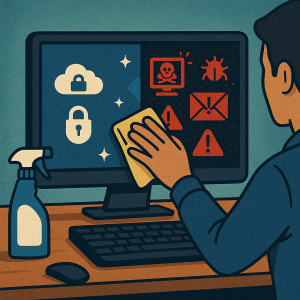
When it comes to protecting your business from cyberthreats, the basics still matter — a lot. According to IBM’s 2023 Cost of a Data Breach Report, 82% of breaches involved data stored in the cloud, and the majority could’ve been prevented with simple, foundational safeguards.
That’s where cyber hygiene comes in — your business’s version of daily handwashing. It’s not flashy, but it’s absolutely essential. If you skip the basics, you’re leaving your business exposed.
Here are four essential steps every business should take to improve cyber hygiene and reduce risk.
Keep Your Network Secure
Your network is your company’s digital front door, and leaving it unprotected is an open invitation to cybercriminals.
-
Use firewalls and encryption to safeguard sensitive business data.
-
Hide your Wi-Fi network using a Service Set Identifier (SSID) so your network name isn’t publicly broadcast.
-
Use strong, unique passwords for your routers and change them regularly.
-
Require remote employees to connect via a Virtual Private Network (VPN) for secure access.
A secure network is the foundation of a healthy cybersecurity strategy.
Teach Your Team How to Stay Protected
Your employees are your first line of defense — and sometimes your biggest vulnerability. Training them on proper cybersecurity practices is one of the most effective ways to reduce risk:
-
Use strong passwords and enable multifactor authentication (MFA) wherever possible.
-
Establish clear guidelines for safe internet use and proper handling of sensitive data.
-
Train your team to recognize phishing emails and avoid downloading suspicious attachments.
The more your employees know, the safer your business will be.
Back Up Your Important Data
Even with strong defenses in place, breaches and crashes can still happen. That’s why regular backups are critical:
-
Automatically back up documents, financial records, HR files, and databases.
-
Store backups securely in the cloud or offsite on an encrypted server.
-
Test your backups regularly to ensure your data can be restored quickly if needed.
Having backups in place ensures your business can keep running even if disaster strikes.
Limit Data Access
Not everyone on your team needs access to everything. The fewer people who have entry points into sensitive systems, the better:
-
Grant employees access only to the data required for their role.
-
Restrict administrative privileges to IT staff and trusted leadership.
-
Remove access for former employees immediately as part of the offboarding process.
By reducing unnecessary access, you significantly decrease the potential damage from a breach.
Security Is Worth the Effort
Cyber hygiene may seem tedious, but the cost of ignoring it is far greater. From ransomware attacks to cloud breaches, the damage from poor security practices can be devastating — both financially and operationally.
By taking proactive steps now, you’ll save your business time, money, and stress later.
Want to Get Ahead of the Threats?
Don’t wait until it’s too late. Download your free Cybersecurity Crisis Report today — an executive guide to protecting your business from today’s most dangerous threats.



